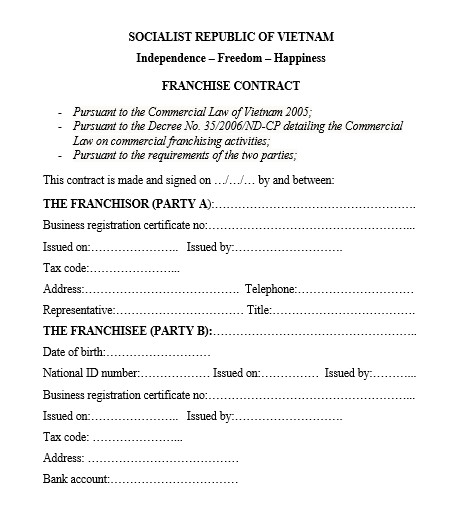_1733_231115.png)
Franchise Contract: Important Things To Know
a year ago
18:01
SAPO: It is not uncommon that there have been many cases of dispute regarding franchise contracts, causing a lot of unsuccessful deals and affecting the connection between the parties. In this article, Inmergers presents a guide to franchise contracts and what you need to know to safeguard your legal rights.
1.What is a Franchise Contract?
A franchise contract is a legally binding agreement between the two main parties of a franchise relationship (the franchisor and the franchisee), setting out the rights and obligations of both sides in a franchise.
Franchising is often applied to some industries such as fast food and chain restaurants, convenience stores, retail, healthcare service and education centers… By signing a franchise contract, the franchisor grants the franchisee the right to use its trademark, business model, and operational systems in exchange for a fee or royalty. Accordingly, the franchisee is allowed to operate a business under the franchisor's brand name, sell its products or services, and receive ongoing support and training from the franchisor.

The franchise contract is considered an “important gear" to ensure the rights of the two parties
Currently, there are several types of franchise contract, categorized based on the parties involved and the nature of different forms of franchising activities. When a franchisee has the right to sub-franchise another third party, the agreement signed between them will be established in the form of a secondary franchise contract. Another type is known as the international franchise contract between a franchisor and an overseas franchisee, which is commonly used when a business wants to expand its operations to other countries without establishing a new business unit.
In franchising, franchise contracts serve a significant role as they provide a clear framework for the relationship between the franchisor and the franchisee. Typically, the franchise agreement outlines the terms and conditions for the parties involved, including the transfer of business processes, industrial property rights, obligations of each party, the franchise fee, and termination rights. As a legal foundation for franchising activity, it is mandatory that the franchise contract must be made in writing or in other forms of equivalent legal validity to protect the interests of both sides in the event of any potential disputes.
2.Key Components of a Franchise Agreement
For any business or entrepreneur considering franchising their business or becoming a franchisee, it is crucial to thoroughly and carefully understand the franchise contract in order to ensure that the agreement is fair and mutually beneficial for both parties involved.
Before signing the contract, the two sides should come to an agreement on the suitable terms and conditions outlining the rights and obligations of the franchisor and the franchisee. The specific details included in a franchise contract may vary depending on the industry and the franchise system, but will typically contain these following main sections:
a. Fees and expenses:
To participate in a franchise system, franchisees must prepare themselves for various fees and expenses that are necessary to acquire the right to use the franchisor's trademark and operate the business in accordance with the franchise system. These expenses may include the franchise fee, as well as ongoing fees such as royalty fees, marketing fees, and any other applicable fees.
- Franchise fee: This is the initial payment that grants the franchisee the legal right to use the franchisor’s intellectual property and operating system. Normally, it also includes some assistance from the franchisor in opening the franchised business. This fee can be done upfront or on an ongoing basis, depending on the terms of the franchise agreement between the parties.
- Royalties/ongoing fees: These are periodic payments that the franchisees are required to pay in the operation of the franchise unit. The most common fee is the royalty fee, which is often paid monthly, usually taking up around 5-10% of the turnover, for the continuing permission to use the franchisor's brand and products. Besides, the ongoing fee may also include the advertising & marketing cost as a contribution to the franchisor’s “brand development fund”.
The fees mentioned above can vary significantly depending on the industry and the specific franchise system. Therefore, it is essential for the franchisee to understand the fee structure, the amount charged and how they are calculated before signing the contract. This understanding will allow the franchisee to evaluate the financial viability of the franchise and make an informed decision regarding their investment.
b. Rights and obligations of each party:
The franchise contract must define clearly the rights and obligations of each party to regulate their roles in the franchise operating. The primary purpose of these requirements is to protect the franchisor's intellectual property and ensure that each franchisee operates their units in adherence to the franchisor's trademark, enhancing the brand’s reputation.
According to the Commercial Law of Vietnam 2005, the obligations stated in the franchise contract are freely agreed upon by both parties, provided that they do not violate any provisions of the law regarding franchising.

A franchise contract need to clarify the basic provisions to guarantee the interests of both parties
Franchisor's Rights and Obligations:
| Rights | Obligations |
| Receiving franchise fees.Organizing advertising activities for the franchise system and network.Inspecting the franchisee's operation to maintain quality and consistency of the franchise system. | Providing a comprehensive operation documentation, initial and ongoing training program, support to the franchisee.Assisting in design and arrangement of sales and service locations.Protecting the intellectual property rights stated in the franchise contract.Treating all franchisees in the franchise system fairly and equally. |
Franchisee's Rights and Obligations:
| Rights | Obligations |
| Requesting the franchisor to provide sufficient technical assistance related to the franchise system.Requiring the franchisor to treat other franchisees equally in the franchise system. | Paying the franchise fees and other payments mentioned the franchise contract.Investing sufficient facilities, financial and human resources to receive the rights and business know-how transferred by the franchisor.Operating the franchise unit in accordance with the franchisor's guidelines and standards.Protecting the franchisor's intellectual property. |
c. Term and renewal
In a franchise agreement, provisions related to the agreement term and renewal are decided by the parties on their own initiative, regarding the duration of the contract and the conditions under which it can be renewed.
The length of time the franchise contract lasts can vary greatly depending on the type of the franchise, typically ranging from 5 to 10 years. In order to determine an appropriate contract length, the franchisor might need to take several factors into account such as the profitability of the franchise, the time required to break even, and also how long the franchisee are expected to operate the franchise successfully. To ensure fairness, the franchise contract should provide franchisees with sufficient time for them to recover the initial investment and debt used for the purchase of the franchise.
After the initial term of the contract expires, the involved parties can choose either to stop the franchise relationship or to renew the contract. When the two sides are happy about the performance and the success of the franchise, they may continue the business and negotiate for another collaboration. The conditions related to terms of renewal or renewal fee must be stated clearly in the initial franchise agreement. It's important for the franchisee to understand these provisions before entering into the agreement, as they will impact the long-term viability of the business.
d. Dispute resolution
Dispute resolution is an important component of any contract, and franchise agreements are no exception. This section of the contract defines the method that will be used to resolve any disputes that arise between the franchisor and the franchisee. The two parties to the franchise contract can choose one of these forms of dispute resolution:
1. Negotiation between the parties.
2. Conciliation between the parties by a conciliation mediator.
3. Resolution by the Arbitration or the Court.
Navigating contract disputes and conflicts can be a complex and thorny process. To ensure that all parties involved understand their responsibilities and obligations in such cases, the franchise agreement must provide a detailed outline of the procedures and costs associated with each resolution option. In order to minimize any potential risks down the road, both the franchisee and franchisor should comprehend these provisions and their implications before signing the contract, as disputes can be costly and disruptive to their business.
3. Franchise Agreement Sample
At the present, the legal framework of Vietnam does not provide for a fixed type of franchise contract. When working with each other, the franchisor and franchisee can negotiate the provisions and build the contracts on their initiative, as long as these terms and conditions do not violate the general law regulating the commercial and business activities.
To safeguard the rights and interests of all parties in the franchise, the contract should specify the information mentioned above. It is suggested that the involved parties get advice and guidance from a trusted legal counsel with franchise experience. In addition, businesses and entrepreneurs can refer to the franchise contract sample provided below to gain an overview of the details that should be specified.

Franchise contract sample for reference
Conclusion
Franchise contracts serve to protect all parties involved in the franchise and a well-written agreement can help to establish a solid foundation for a successful and mutually beneficial business relationship. However, it is sometimes inevitable to get involved in unwanted arguments and legal issues. Hence, both franchisor and franchisee are recommended to seek legal counsel thoroughly before signing a franchise agreement in order to minimize any potential unfavorable situations.
For more qualified opportunities, join MMatch - the business trading platform of Inmergers to connect with potential businesses, investors and receive legal advice to maximize profit from your investment.
